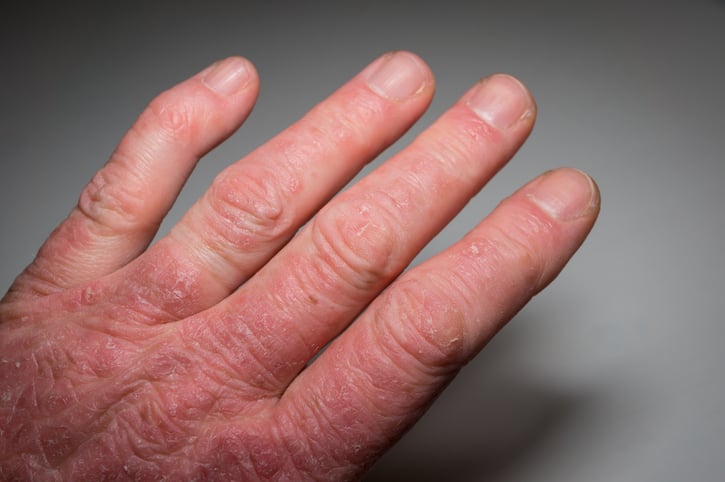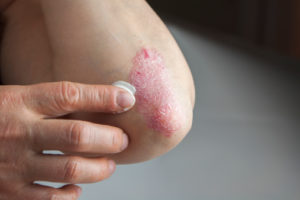Psoriasis is a skin disease that causes a red, scaly rash topped with silvery scales, most often located on the elbows, knees, ankles, feet, and hands. It affects millions of Americans and nearly one third of all people with this condition develop a condition called psoriatic arthritis, (or PsA)

Psoriatic arthritis is an autoimmune condition that causes inflammation in the joints as well as overproduction of skin cells. In addition to the psoriatic rash, the symptoms of psoriatic arthritis are not unlike those of other types of inflammatory arthritis, which include painful and swollen joints that are warm to the touch. Other symptoms of psoriatic arthritis include:
- Swollen knees, ankles, feet and hands
- Stiff Joints, which are typically worse in the morning
- Back, neck, and shoulder pain
- Inflammation where a muscle connects to a bone, such as the Achilles tendon
- Tiny ridges or dents called “pitting” in the nails.
- Physical and mental exhaustion
PsA symptoms can range from mild to severe, with symptoms usually progressively worsening over time. Those with psoriasis as well as psoriatic arthritis may experience alternating periods of “flare-ups” followed by periods of remission.
If left untreated, inflammation associated with PsA can result in serious damage to joints and tissues. Those with PsA are also at a higher risk of developing other conditions such as cardiovascular disease, Crohn’s disease, type 2 diabetes, gout, and certain eye conditions.
Those most at risk of developing PsA are those who have psoriasis or have a family member living with the condition. It can develop at any age, but is most often occurs in adults between the ages of 30 and 50.
There is currently no cure for psoriatic arthritis, but with treatment, the symptoms can be controlled. Medications can often help manage psoriatic arthritis, but when they don’t, surgery might be an option.
Inform your doctor if you have psoriasis and begin to develop joint pain. To make an appointment at Flushing Hospital’s Ambulatory Care Center, please call. 718-670-5486.
All content of this newsletter is intended for general information purposes only and is not intended or implied to be a substitute for professional medical advice, diagnosis or treatment. Please consult a medical professional before adopting any of the suggestions on this page. You must never disregard professional medical advice or delay seeking medical treatment based upon any content of this newsletter. PROMPTLY CONSULT YOUR PHYSICIAN OR CALL 911 IF YOU BELIEVE YOU HAVE A MEDICAL EMERGENCY.

